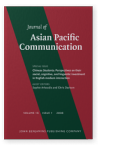Book review
Xinmin Zheng & Chris Davison. Changing Pedagogy: Analyzing ELT teachers in China. Xinmin Zheng & Chris Davison. Continuum Academic Publishers, 2008. 224 pp.
References (7)
References
Brody, C. (1998). The significance of teacher beliefs for professional development and cooperative learning. In Brody, C., & Davidson, N. (Eds.), Professional development for cooperative learning: Issues and approaches (pp.25–48). Albany: Albany State University of New York Press
Davison, C. (2001). Identity and ideology: The problem of defining and defending ESLness. In B. Mohan, C. Leung & C. Davison (Eds). English as a secondary language in the Mainstream: Teaching, learning and identity (pp. 71–90). Harlow: Longman.
Fullan, M. (2001). The new meaning of educational change. New York: Teachers’ College Press. 

Lam, S. L. A. (2005). Language education in China: Policy and experience from 1949. Hong Kong: University of Hong Kong Press. 

Lam, S. L. A. (2007). The multi-agent model in language choice: National planning and individual volition in China. Cambridge Journal of Education, 37(1), 67–87. 

Tsui, A. B. M. (2003). Understanding expertise in teaching: Case studies of second language teachers. Cambridge: Cambridge University Press. 

Wu, Yi’an. (2005). Zoujin Gaoxiao Yingyu Jiaoshi [Towards a professional profile for effective university EFL teachers]. Waiyu Jiaoxue yu Yanjiu [Foreign Language Teaching and Research], 37(3), 15–27.
